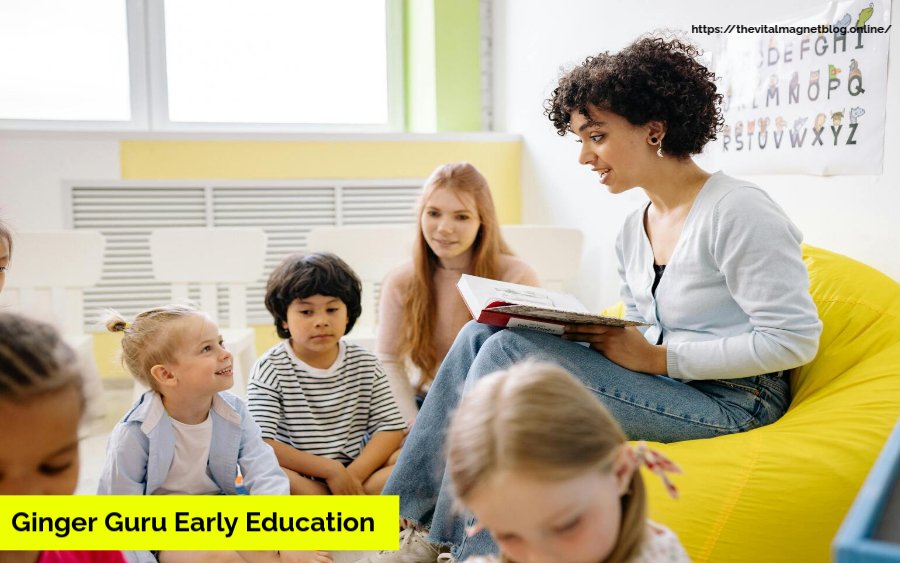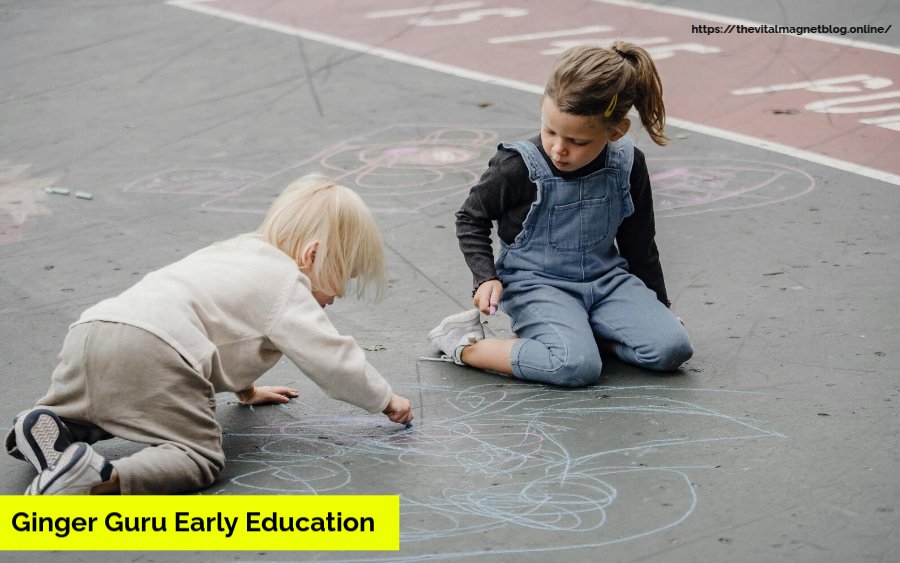Early education lays the foundation for a child’s lifelong learning journey, and no one understands this better than Ginger Guru. Her approach to teaching young children has become an influential model for educators around the world. Whether you’re a teacher, parent, or advocate for early childhood development, understanding Ginger Guru’s philosophy on early education is essential. This article explores the significance of early education, the methods championed by Ginger Guru, and why this topic should be a priority for all of us.
Table of Contents
Why Early Education Matters
The early years of a child’s life are critical. This is the period when their brain is most malleable, absorbing information like a sponge. According to experts, a child’s brain develops faster during their first five years than at any other time in life. Ginger Guru emphasizes the importance of these years, advocating for learning environments that nurture curiosity, creativity, and emotional well-being.
Without a strong foundation in early education, children may face challenges in later schooling. By focusing on this critical period, educators can help children build the skills they need to succeed, not just academically but in all areas of life.
Ginger Guru’s Vision for Early Education
Ginger Guru believes that early education should go beyond academics. Her philosophy revolves around nurturing the whole child—intellectually, emotionally, socially, and physically. In her view, play-based learning, social interactions, and fostering emotional intelligence are just as crucial as teaching numbers and letters.
Through her work, Ginger Guru advocates for classrooms where children feel safe to explore, question, and express themselves. These environments allow children to develop independence, resilience, and a love for learning that lasts a lifetime.
The Role of Teachers in Early Education
In Ginger Guru’s world, teachers aren’t just instructors—they’re mentors, guides, and role models. She stresses the importance of strong teacher-student relationships, emphasizing that children need trusted adults who understand their individual needs and learning styles. When a teacher connects with a child on an emotional level, it creates a positive environment for learning.

Teachers should also have access to ongoing professional development to stay updated on the latest early childhood education practices. Ginger Guru has inspired a generation of educators to continuously evolve their teaching strategies to meet the ever-changing needs of young learners.
Parents as Partners in Learning
Another key element of Ginger Guru’s approach is the involvement of parents. She believes that education doesn’t stop at the classroom door—parents play a crucial role in supporting their child’s learning at home. Whether it’s reading together, exploring nature, or discussing their child’s day, parents can reinforce and extend what children learn in school.
By working closely with teachers, parents can better understand how to foster a love of learning in their children. This partnership between home and school is a vital part of a child’s success.

Play-Based Learning: More Than Just Fun
Ginger Guru is a strong advocate for play-based learning, understanding that children learn best when they’re engaged and having fun. Play allows children to explore concepts like problem-solving, teamwork, and creativity in a natural way. Whether they’re building with blocks or playing pretend, children are developing cognitive and social skills that will benefit them throughout life.
This approach to early education contrasts with more traditional methods that focus solely on structured activities and rote learning. Ginger Guru believes that balance is key—incorporating play with more formal learning experiences ensures that children enjoy their education while also making significant developmental strides.

Emotional Development in Early Education
One of Ginger Guru’s major focuses is emotional development. She emphasizes teaching children how to recognize and manage their emotions from an early age. Developing emotional intelligence allows children to build stronger relationships, handle conflict, and approach challenges with a growth mindset.
Teachers who follow Ginger Guru’s methods often incorporate mindfulness practices, helping children develop emotional regulation skills. These tools not only help students in the classroom but also prepare them for life’s ups and downs.
The Importance of Socialization
In today’s digital age, social skills are more important than ever. Ginger Guru stresses the importance of giving children ample opportunities to interact with their peers. Group activities, cooperative play, and shared problem-solving tasks allow children to learn how to communicate effectively, collaborate, and develop empathy.
These early social experiences help children build the foundational skills they’ll need to navigate friendships, work environments, and social settings throughout their lives.
The Future of Early Education
Ginger Guru’s vision for the future of early education extends beyond the classroom. With advancements in technology, educators can now offer interactive and personalized learning experiences that meet the unique needs of each child. While technology is an exciting tool, Ginger Guru emphasizes that it should never replace human interaction and hands-on learning.
She foresees a future where educators use technology to enhance learning, not dominate it. For example, children can explore virtual field trips or engage in interactive storytelling, all while maintaining an active, play-based learning environment.
Advocating for Accessible Early Education
For Ginger Guru, one of the most pressing issues in early education is accessibility. She believes that all children, regardless of background or socioeconomic status, deserve high-quality early education. Ginger has advocated for policies that ensure all families have access to early learning programs, particularly those in underserved communities.
Providing early education opportunities to all children not only benefits individuals but society as a whole. Research shows that children who receive quality early education are more likely to succeed academically, earn higher incomes, and contribute positively to their communities later in life.
Building Classrooms That Nurture Growth
To support children’s growth, Ginger Guru champions the creation of learning environments that inspire curiosity and discovery. Classrooms should be flexible spaces where children can move freely, explore different learning stations, and engage in both individual and group activities.
Ginger also advocates for outdoor learning, recognizing the value of nature in a child’s development. Whether it’s a classroom garden or a nature walk, these experiences allow children to connect with the world around them and develop a sense of responsibility for the environment.
Conclusion: The Lasting Impact of Ginger Guru’s Work
Ginger Guru’s dedication to early education has shaped how we think about teaching young children. Her holistic approach emphasizes the importance of emotional, social, and cognitive development, providing children with the tools they need for success in school and beyond.
Whether you’re an educator looking for innovative teaching strategies, a parent seeking to support your child’s development, or a policymaker advocating for education reform, Ginger Guru’s insights into early education are invaluable. By following her lead, we can create learning environments that nurture the whole child and set the stage for a bright future.
FAQ
1. Who is Ginger Guru?
Ginger Guru is an influential educator and thought leader in the field of early childhood education. Known for her holistic approach, she advocates for teaching that supports a child’s intellectual, emotional, social, and physical development. Her methodologies are widely used and admired in early education settings worldwide.
2. Why is early education so important?
Early education lays the foundation for all future learning. The first few years of life are when a child’s brain is most receptive to absorbing information. Quality early education programs promote cognitive development, emotional well-being, and social skills, setting the stage for lifelong learning and success.
3. What is Ginger Guru’s approach to early education?
Ginger Guru emphasizes a well-rounded approach to education that includes not just academics but also emotional and social development. Her philosophy supports play-based learning, teacher-student relationships, emotional intelligence, and parental involvement as key factors in a child’s early education journey.
4. How does play-based learning benefit children?
Play-based learning encourages children to explore, experiment, and interact with their environment in a natural way. It promotes cognitive, social, and emotional skills while making learning enjoyable. Through play, children develop creativity, problem-solving abilities, and social competencies.
5. What role do parents play in Ginger Guru’s approach?
Parents are crucial partners in a child’s early education, according to Ginger Guru. She encourages parents to engage with their children’s learning at home through activities like reading, playing, and discussing daily experiences. This creates a seamless learning environment between school and home.
6. How can teachers implement Ginger Guru’s methods in their classrooms?
Teachers can implement Ginger Guru’s methods by creating learning environments that are safe, flexible, and conducive to exploration. Her approach encourages fostering strong teacher-student relationships, promoting emotional development, and incorporating play-based learning into the curriculum.
7. What is emotional development, and why is it important in early education?
Emotional development involves teaching children how to understand and manage their emotions. It’s important because it helps children build healthy relationships, handle stress, and approach challenges with a positive mindset. Emotional intelligence developed in early childhood has long-term benefits for personal and academic success.
8. How does Ginger Guru view technology in early education?
Ginger Guru supports using technology as a supplementary tool in early education, but she emphasizes that it should never replace hands-on learning and human interaction. Technology can enhance learning experiences, but it’s important to maintain a balance between tech use and traditional play-based activities.
9. What makes Ginger Guru’s methods stand out from traditional early education approaches?
Ginger Guru’s methods stand out because of their holistic nature. Unlike traditional approaches that may focus solely on academics, her philosophy nurtures the whole child—intellectually, emotionally, socially, and physically. She also champions the importance of play, emotional intelligence, and strong teacher-student and parent-child relationships.
10. How can early education accessibility be improved, according to Ginger Guru?
Ginger Guru advocates for policies that make early education accessible to all children, regardless of socioeconomic background. She believes that governments and communities should invest in programs that provide quality early education for underserved populations, ensuring that every child has the opportunity to thrive.
Note: I’m here to help—if you’d like me to write a blog for you, feel free to Contact us.
